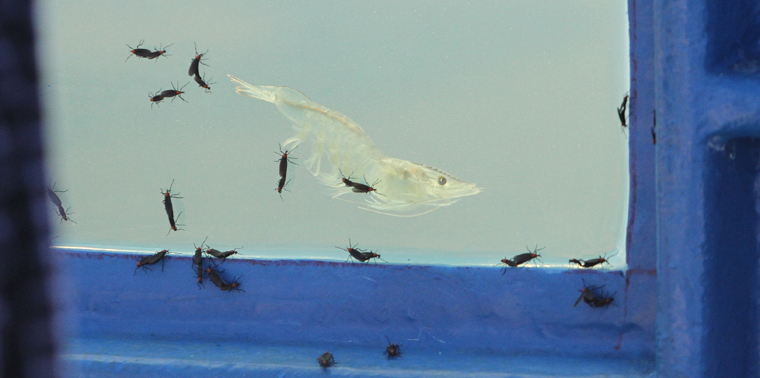
FELLSMERE — The place in the marsh and grove lands of western Indian River County where County Road 512 curves east toward Fellsmere, has always felt pretty much like the middle of nowhere. But that was then.
Wednesday, 600 or so people gathered at the Florida Organic Aquaculture shrimp farm to celebrate the operation’s official grand opening and to tour the amazing, high-tech facility, the self-proclaimed “home of happy, healthy shrimp,” expected to produce a couple million shrimp per year. The first harvest is expected soon.
Elected officials from Fellsmere, Sebastian, Vero Beach and Indian River County joined state officials, Indian River State College and University of Florida dignitaries and numerous area business people, farmers, growers, fishermen and residents.
The crowd was met with a bountiful buffet and music from the Sebastian Charter High School Jazz Ensemble. A large tent set up with a few hundred chairs offered relief from the blazing sun and a view of the speakers’ stand and the overflow crowd stood around the edges, sharing the air with countless lovebugs.
Indian River State College President Dr. Ed Massey president said the “introduction of this great industry, integrating technology that hasn’t been done here before will (result in) another great Florida product” alongside citrus.
Sid Banack, a long-time Indian River County insurance and citrus industry visionary, called it “a wonderful, new agricultural venture, one of the first such plants in the country, on the leading edge in the seafood industry.”
“Exciting,” said Indian River County Commissioner Peter O’Bryan. “I think this venture will bear fruit – or rather – shrimp. It will not only create jobs but, the expansion of the natural gas line that went in to serve the needs of this industry will have a positive impact on other businesses and residents in the area.”
Indian River Shores Town Councilman Jerry Weick noted the benefits of bringing this new technology to the area and sees the operation as one that can “help a lot of people.”
“It’s breathtaking,” said County Commissioner Joe Flescher. “Imagine, in Fellsmere, it’s brilliant to locate it here. And there’s room to expand, almost to the Elephant Center. To have this here helps Fellsmere, and Sebastian and Indian River County. A blessing for Fellsmere’s economy and – we all win.”
Terri Pinney, Executive Director of the Florida Aquaculture Foundation, welcomed the crowd and pointed out that, in addition to the aquaculture buildings, there is also an onsite building for the interns who come from area colleges to work and learn. An educational facility is also planned to share the technology.
She then introduced Rep. Debbie Mayfield, who congratulated the FOA founder Cliff Morris and said, “It is just what the State of Florida needs – to create jobs. My daddy was a commercial fisherman – a shrimper. Thank you Cliff – you are a visionary.”
Pinney then introduced Morris, who has directed several ventures in the U.S., Europe and his native South Africa. As he spoke, his great enthusiasm and passion for the operation was very clear. He emphasized how very welcoming the city and county officials have been and impressed he is with the collaboration they were able to create and the “can-do” attitude that prevailed as the project took shape about a year and a half ago.
He gave a special shout-out to Jason Nunemaker, chair of the Florida Aquaculture Foundation and Fellsmere City Manager, with whom he works very closely.
“Now Fellsmere will be on the map, not just with an arrow pointing toward Fellsmere,” he predicted.
The technology, Morris said, developed by scientists and researchers, is available to everyone, through the university. He expressed sincere thanks to the University of Florida and Indian River State College.
“The wealth of brain power in our own backyard. I believe in the power of collective wisdom,” he said.
“We are optimistic,” Nunemaker said, addressing the crowd. “This transformation of agricultural opportunities is extremely significant. Indian River County has shown itself to be forward thinking” when it comes to jobs and economic issues.
The crowd got in line to tour the vast facility – all 4.2 acres of it – which is the nursery for hundreds of thousands of shrimp. Each of the two buildings houses three 1,000-cubic-meter recirculating water systems called raceways, (because they resemble huge, water-filled racetracks).
Each contains 35,000 gallons of soupy, muddy looking water, which contains very nutritious food, completely pollution free and carefully temperature-controlled. This is home to some 50,000 shrimp, which are introduced into the system as post larval babies and spend their lives growing into “Happy Healthy Shrimp,” in the enclosed system.
Each three-raceway buildings is expected to produce 1 million pounds of shrimp per year, all sushi-ready, fat, healthy and home-grown.



